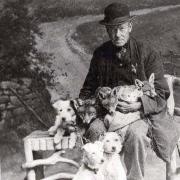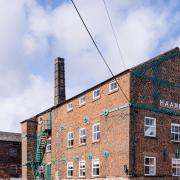Penelope Baddeley visits the 100 acre Garden Farm at High Leas, Matlock

‘That’s Lucy. Just look at her! She has proper Viking horns!’ says Tim Sidaway.
We are in a driving in a Land Rover on a resplendently sunshine-filled afternoon, across the gently undulating green and golden fields that make-up the 100 acre Garden Farm at High Leas, just outside of Matlock.
Lucy is part of Tim’s individually named herd of Shetland Cattle, a breed so rare it features on the critical list of the Rare Breeds Survival Trust.
Tim is tenant farmer of the organic mixed livestock farm which lies perched at the top of a steep and partially wooded access track, deep into the glorious Derbyshire countryside.

The picture-book farm is home to a handful of geese, hens, and three horses as well as the flock of Manx Loaghtan sheep from the Isle of Man and the White-Faced Woodland sheep, which originally hail from North Derbyshire and South Yorkshire and so suit the Peak District.
Here in the idyllic rural setting the animals are reared slowly, naturally and healthily, free from interventions such as routine mass medication with antibiotics, which can be the norm in large commercial farming businesses.
The fact that these rare breeds are being actively farmed saves them from becoming museum pieces; it upkeeps an animal heritage of traditional breeds that have long since been bypassed by the modern more intensive systems of farming.
‘The more we eat them the less endangered they will be,’ says Tim.

His small scale enterprise is registered with the Soil Association and thus operates from fields free from sprayed pesticides and insecticide. It’s governed by Tim’s desire to re-establish the link between customer and farmer and to return to a method of farming which fosters good quality, good flavoured meat.
As one of his older clients sagely noted: ‘Isn’t organic what we just used to call meat?’
Tim’s beasts are slaughtered locally at Buxton and sold direct to customers and clients such as The Real Meat butcher’s on Ecclesall Road in Sheffield, where staff can tell customers exactly how and where their meat was reared.
Tim said: ‘I’m all for getting a closer relationship between farmer and customer and for example, when someone down my local pub tells me he has space in his freezer for a lamb, well I can do that too.

‘I get to sell the whole animal, the customer then tends to use all the bits they wouldn’t normally buy and they are purchasing the lamb at a cheaper price per kilo.’
Becoming a livestock farmer in Derbyshire was quite a career change for this former vegetarian graphic designer from Bedfordshire.
‘I never set out to be a livestock farmer,’ laughed Tim. ‘I was vegetarian for 15 years but it wasn’t because I didn’t like meat. I actually spent quite a lot of time thinking about meat. The problem for me was not having any control over where your meat comes from. If you can’t find organic meat in a supermarket where do you get it from?
‘I decided I’d rear it for myself.’

Initially he got chickens, a few pigs and set up a small part-time business to promote local food in his home town of Potton in Bedfordshire. He became passionate about communicating the story of organic food and creating interest in its production.
But then more than five years ago, Tim took the plunge to move to Derbyshire with his family, including Emily aged 15 and Frank aged 12.
The county offered a more financially viable means of a new farming lifestyle and the family is now as firmly rooted as the vegetables which are also grown on site.
‘I basically spent the first few years working out what the hell I was doing because I’d never farmed before,’ he laughed.
‘Now I can’t imagine doing anything else or living anywhere but Derbyshire. The place is just great.’
At the heart of Tim’s vision is the sincere aim to include the local community in Garden Farm – particularly the most vulnerable sections of society.
‘I wanted care farming to be one of the strands of what we do here,’ he said.
Care Farming is a movement becoming increasingly popular across Europe and involves the therapeutic use of farming practices. Community farms, smallholders and commercial agricultural units provide rural space, and structured programmes of farming related activity such as animal husbandry, woodland management and vegetable production, to benefit individuals with problems ranging from mental health issues, learning disabilities and drug addiction.
Tim said: ‘It’s not so well known in the UK but in the Netherlands there are many thousands of Care Farms and clients who visit their GP can get a prescription to come to a farm for a period of months rather than being given anti-depressants.’
A report by the National Care Farming Initiative (UK) states that in 2006 there were at least 76 such farms in the UK, providing a range of health, social rehabilitation and educational benefits to over 5,000 people a week.
Tim set up Garden Farm LIFE to provide ‘green care’ four years ago and his clients are referred from a variety of local agencies including the Derbyshire Federation of Mental Health, a charity based in Matlock.
The care farm, known as Garden Farm LIFE, is a separate business and social enterprise, which has in the past accrued funding from the Big Lottery. And last winter the farm secured 12 months use of a Land Rover, via a rural bursary provided by Land Rover in conjunction with the Prince’s Countryside Fund in recognition of Tim’s work towards achieving ‘a long term positive difference to the local community’.
It’s beneficial to clients who report increased sense of wellbeing and to Green Farm, who gain from having extra pairs of hands for multitudinous tasks, from those clients who are able to engage in meaningful work. But from Tim’s perspective it is generally a voluntary business, with no profit being made.
In other European countries care farms are often formally tied to local social services and hospitals. This can allow a farm to stay economically viable as farmers are paid for providing a kind of ‘health service’, whilst continuing with small scale agriculture.
‘It’s really a voluntary exercise from my point of view,’ said Tim. ‘But it’s a very valuable approach to dealing with social issues that will hopefully gain a lot more support over time.’
Clients, some of whom have been visiting the farm for several years, take part in activities ranging from making sheep hurdles to servicing beehives or mucking out barns and planting vegetables. When the weather’s bad there are indoor jobs such as cleaning horse harnesses.
Vanessa Swetman owns Peak Organics and grows vegetables on a 900 metre by 30 metre plot at Garden Farm. She is also involved with ‘green care’ activities for clients.
She said: ‘Some of the clients love working with the horses, others can’t stand gardening. It’s all about creating a space where people can do what suits them. For some that can be just about sitting here and having a cup of tea.
‘If you have a mental health problem or a learning difficulty you can be quite isolated from the community so for some people just coming here is beneficial.
‘There’s still stigma attached to mental health problems so for clients to be in a non-judgemental environment is valuable. They are just accepted here as part of the team.
‘So much of what we deal with in life is to do with materialistic, competitive things and people are judged on what they do for a living or what they have. So to watch people flourish in a space which is not about those things is quite powerful.’
For Tim the rural environment itself fosters an equitable non-judgemental attitude.
He said: ‘People from all walks of life are affected by mental health issues but here it does not matter if you are a barrister or a barrow boy. Working in a farm, getting covered in poo is a very levelling thing!
‘And animals are very levelling too. They don’t judge us or know whether or not we have mental health problems. They just need us to care for them.’ Evidence of the positive relationship between exposure to nature and individual health is growing, according to a National Care Farming Initiative report (2008). Care farmers report physical and mental health benefits experienced by their clients, enhanced trust in other people, calmness, formation of work habits, development of social skills and personal responsibility.
At Garden Farm clients report a feeling of camaraderie, increased sense of self worth, well-being and confidence.
Matthew is the longest attending volunteer at Garden Farm Life. He has been attending every Tuesday since September 2012. Affected by a severe form of Asberger’s syndrome Matthew did not speak until becoming an adult but tells me he’s made friends here.
‘It’s brilliant coming here. I’ve got to know what jobs come up at each point in the year.’
He added: ‘My parents have noticed a difference. They think it’s my best day when I come here.’
Another client who was struggling with bi-polar disorder when she first attended, went on to get a job with Citizens’ Advice and was due (this October) to start a law degree.
Tim said: ‘It’s just fantastic to share this space with people and see what they get out of it. I genuinely feel I’m quite lucky to be here and it’s something that I want to go on sharing with other people.’
Phillip aged 45, from Ashbourne, is a paranoid schizophrenic and has been attending at Garden Farm for more than two years. Over that time he has groomed horses, dug holes, put in posts, herded sheep and woven hazel and willow livestock barriers.
He said: ‘I’d never worked on a farm before and sometimes the work is quite hard to do physically but that seems to help make my mind a little healthier.
It’s a great place and I look forward to coming every week for the fresh air, the people and the exercise. It’s important to me that I do this.’
Paul is a former maintenance engineer and walks the steep 45 minute trek from his home in Cromford to the farm every week. He was referred to Garden Farm by the Derbyshire Federation of Mental Health after suffering from depression.
He said: ‘I’ve always been interested in environmental work and love the physical activity because it gets the natural endorphins going. It’s grand to be working and in such good company. Everyone mucks in and helps one another here. Being here has made a substantial difference to me.
In other words: medication, zero, natural endorphins, 10.’
The atmosphere is genial and celebratory as the group of volunteers sit down to enjoy their packed lunches on a picnic bench in the bright sunshine with the farm dogs, Meg and Barkis, at their feet.
Backdrop to the scene, reminiscent of an image from a Thomas Hardy novel, are the ancient gritstone farm buildings which have provided shelter for hundreds of years and at the heart of the farm is a big open social space known as the ‘Tractor Shed’, which is complete with two old pianos and a bar.
It’s a hive of activity during the annual Dethick, Lea and Holloway village carnival week, for a barrel race runs right through the farm. The Tractor shed is also hired out to various groups including local orienteers, horse riding organisations and community groups such as the scouts.
On occasions like these Tim gets a chance to cook and sell sausages to the visitors.
Tim said: ‘I believe in a traditional farm with a mix of activities and people and I try to stand outside the current large scale commercial system.
It’s not a job as such, it’s a lifestyle. Granted you have to take a different view on money and what is important. But it’s a way to have a nice life. I have enough for a pint in the evening and my kids are well fed.’



























